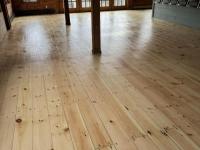Domestic Abuse and Faith Communities
Trauma from domestic abuse affects survivors in every aspect of their human existence—body, mind and spirit. While physical injuries and wounds can be diagnosed and treated by medical professionals, the cruelty and oppression that even non-violent abusers inflict can only be ameliorated through community support, understanding and a collective commitment to supporting victims and holding abusers accountable.
Although church membership and involvement have been declining in the US for a number of years, according to a study by the Pew Research Center, nearly 40% of people do belong to a faith community and embrace some level of religious practice. Faith communities and leaders can be helpers in victim support and healing. Clergy are well situated to confidentially provide resources, referrals and an understanding ear. Having materials on hand from a local Domestic Violence Resource Center—posters in the restrooms, for example, with local helpline numbers prominently displayed—sends the message that abuse is not countenanced by their faith tradition or excused by scripture and that it is okay for survivors to reach out for help.
In Maine, congregations of all denominations tend to be a bit like the small towns where so many of their parishioners reside. Relationships are multi-stranded, and people feel close ties to each other. This can be a positive thing for people, in good times and in bad. Intimacy and shared values foster mutual caring. However, that same closeness can also constitute a barrier to getting help, especially when the abuser is also a part of that community. Domestic abusers carefully manage their own reputations while working hard to undermine the credibility of their victims. Therefore, survivors may find that the people they look to for support either don’t believe them about the abuse or may look for reasons to excuse the abuser’s behavior.
There are some ways that religious leaders can address domestic violence:
-
Encourage open discussion regarding the societal context in which the scripture was written and more contemporary thought regarding gender roles and acceptable family practices.
-
Host congregational discussions to talk about what people are entitled to in families and households (i.e., safety, access to resources, freedom).
-
Invite local domestic violence advocates to speak at services or coffee hours.
-
Countermand implicit victim-blaming messages and explain that domestic abuse violates people’s most basic human and civil rights.
-
In many religions, marriage is framed as a covenant that parallels the relationship between G-d and humans. Victims who are devout sometimes mistakenly believe that leaving their abuser would violate this covenant. This misunderstanding is an opportunity for clergy to gently assert that it is the abuser who violates the covenant, not the victim’s leaving.
-
Individual pastoral counseling can be helpful. However, when abuse is present, couples counseling has been shown to make victims less safe. Avoid providing couples counseling if you suspect one party is using power and control over the other.
Fellow congregants can also do their part to help support survivors of abuse:
-
Be the safe person to whom a victim can divulge the abuse in confidence.
-
Try not to tell them what to do. Empathetic listening and non-directive, non-judgmental support are what domestic abuse victims need from people in their lives.
-
Don’t share what a victim tells you without explicit permission. Doing so can make the person less safe if their abuser should hear they told someone.
-
Understand local resources and help them find the ones that best meet their needs.
-
Collectively organize material supports that can help a victim leave their abuser—typically money, gas cards, food, help with childcare and clothing.
-
Help them understand that the abuse is not their fault. No one is entitled to limit their freedom or make them unsafe.
-
Avoid victim-blaming or making excuses for domestic abuse. Even when you know and care about both people involved, presenting with kindness and understanding for the victim takes nothing away from the other party.
New Hope Midcoast is one of Maine’s Regional Domestic Violence Resource Centers and a member of the Maine Coalition to End Domestic Violence. The nonprofit organization supports people impacted by domestic abuse, dating violence and stalking through housing and legal advocacy, education and prevention programs, and a 24/7 helpline. The organization serves Sagadahoc, Lincoln, Knox and Waldo counties. New Hope continues to meet clients where they are and recognizes that the impact of domestic abuse is widespread. We are survivor-led and believe that, together, we can address social concerns that continue right here in our communities.































